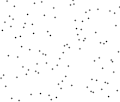Heap's algorithm generates all possible permutations of n objects. It was first proposed by B. R. Heap in 1963. The algorithm minimizes movement: it generates...
13 KB (1,833 words) - 04:44, 8 October 2024
heapsort sorting algorithm. Heaps are also crucial in several efficient graph algorithms such as Dijkstra's algorithm. When a heap is a complete binary...
16 KB (2,922 words) - 01:18, 11 October 2024
Dijkstra's algorithm (/ˈdaɪkstrəz/ DYKE-strəz) is an algorithm for finding the shortest paths between nodes in a weighted graph, which may represent,...
46 KB (5,894 words) - 15:25, 27 October 2024
min-heaps. Efficient (that is, logarithmic time) algorithms are known for the two operations needed to implement a priority queue on a binary heap: Inserting...
29 KB (5,120 words) - 00:02, 13 October 2024
Fibonacci heaps improves the asymptotic running time of algorithms which utilize priority queues. For example, Dijkstra's algorithm and Prim's algorithm can...
19 KB (3,772 words) - 22:17, 18 June 2024
In computer science, Prim's algorithm is a greedy algorithm that finds a minimum spanning tree for a weighted undirected graph. This means it finds a...
18 KB (2,155 words) - 14:54, 25 October 2024
A* (pronounced "A-star") is a graph traversal and pathfinding algorithm that is used in many fields of computer science due to its completeness, optimality...
39 KB (4,807 words) - 20:41, 2 November 2024
_{2}i\rfloor } in the heap. Creating a min-max heap is accomplished by an adaptation of Floyd's linear-time heap construction algorithm, which proceeds in...
15 KB (2,117 words) - 17:37, 11 April 2024
machine-integer keys in time O(m + n log n / log log n). This allows Dijkstra's algorithm to be performed in the same O(m + n log n / log log n) time bound on graphs...
1 KB (163 words) - 05:50, 22 April 2024
Permutation (redirect from Permutation algorithms)
Lexicographic ordering; Steinhaus–Johnson–Trotter algorithm; Heap's algorithm; Ehrlich's star-transposition algorithm: in each step, the first entry of the permutation...
78 KB (11,537 words) - 17:53, 3 November 2024
In computer science, k-way merge algorithms or multiway merges are a specific type of sequence merge algorithms that specialize in taking in k sorted lists...
15 KB (2,409 words) - 21:32, 3 September 2024
In computer science, a sorting algorithm is an algorithm that puts elements of a list into an order. The most frequently used orders are numerical order...
68 KB (6,408 words) - 17:30, 26 September 2024
Bit-reversal permutation Claw-free permutation Heap's algorithm Permutation automaton Schreier vector Sorting algorithm Sorting network Substitution–permutation...
4 KB (282 words) - 11:52, 17 July 2024
Provides algorithms to create, insert, and remove elements from a max heap [[Max heap|make_heap]] [[Max heap|push_heap]] [[Max heap|pop_heap]] [[Max heap|sort_heap]]...
7 KB (708 words) - 17:47, 25 August 2024
sorting algorithm Heap overflow, a type of buffer overflow that occurs in the heap data area Sorites paradox, also known as the paradox of the heap Heap (surname)...
1 KB (201 words) - 06:59, 12 January 2024
to the second subset, because they are greater than or equal to the soft heap's (possibly corrupted) value of L {\displaystyle L} , which is in turn greater...
9 KB (1,250 words) - 17:19, 29 July 2024
(incorrectly) credited as one of the original publications of the algorithm. Heap's algorithm, a different method for listing all permutations Fisher–Yates...
21 KB (2,854 words) - 23:11, 5 September 2024
heap-based algorithm; in practice, it may be about as fast or slow as the heap-based algorithm. A parallel version of the binary merge algorithm can serve...
16 KB (2,087 words) - 07:02, 24 August 2023
In computer science, a selection algorithm is an algorithm for finding the k {\displaystyle k} th smallest value in a collection of ordered values, such...
45 KB (5,755 words) - 16:47, 29 July 2024
merge two heaps more generally, the lists of roots of both heaps are traversed simultaneously in a manner similar to that of the merge algorithm, in a sequence...
13 KB (2,566 words) - 20:02, 27 April 2024
algorithms as Prim's MST algorithm, and support the following operations (assuming a min-heap): find-min: simply return the top element of the heap....
13 KB (2,279 words) - 12:21, 25 April 2024
binary heaps, at the expense of slower delete minimum operations. This tradeoff leads to better running times for algorithms such as Dijkstra's algorithm in...
12 KB (1,743 words) - 21:52, 15 October 2024
and algorithm variation. Normal Data Execution Prevention (DEP) and ASLR also help to mitigate this attack. The most common detection method for heap overflows...
6 KB (679 words) - 23:28, 10 October 2024
objects in the heap in the same fashion as the mark–sweep algorithm, the heap will often be fragmented. The goal of mark–compact algorithms is to shift the...
7 KB (1,028 words) - 12:12, 15 February 2024
Johnson's algorithm is a way to find the shortest paths between all pairs of vertices in an edge-weighted directed graph. It allows some of the edge weights...
7 KB (1,060 words) - 19:56, 12 October 2024
Discrete Algorithms, pp. 52–58 Goodrich, Michael T.; Tamassia, Roberto (2004). "7.3.6. Bottom-Up Heap Construction". Data Structures and Algorithms in Java...
32 KB (4,891 words) - 21:19, 13 October 2024
The Hungarian method is a combinatorial optimization algorithm that solves the assignment problem in polynomial time and which anticipated later primal–dual...
40 KB (5,515 words) - 06:40, 28 September 2024
There are other heap variants which are efficient in computers using virtual memory or caches, such as cache-oblivious algorithms, k-heaps, and van Emde...
6 KB (893 words) - 21:30, 18 August 2023
Memory management (redirect from Allocation algorithms)
there are no "memory leaks"). The specific dynamic memory allocation algorithm implemented can impact performance significantly. A study conducted in...
26 KB (3,002 words) - 10:28, 3 November 2024










